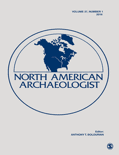
NORTH AMERICAN ARCHAEOLOGIST
metrics 2024
Innovating Archaeological Perspectives in North America
Introduction
NORTH AMERICAN ARCHAEOLOGIST, published by SAGE PUBLICATIONS INC, is a prestigious journal that serves as an essential resource for professionals and scholars in the field of archaeology. With its ISSN 0197-6931 and E-ISSN 1541-3543, the journal aims to disseminate high-quality research that contributes to the understanding of the historical and cultural significance of North America from prehistory to the present. As of 2023, it holds an impressive Q2 category in Archaeology and ranks within the Q1 tier for Archaeology (arts and humanities), positioning it among the top journals in its field. Its Scopus rankings further emphasize its significance, reflecting a commendable percentile standing that underscores its influence in both arts and humanities and social sciences. The journal is committed to offering a platform for innovative research and scholarly discussion, making it invaluable for researchers, professionals, and students dedicated to advancing archaeological knowledge.
Metrics 2024
 0.36
0.36 0.70
0.70 0.50
0.50 16
16Metrics History
Rank 2024
Scopus
JCI (Web Of Science)
Quartile History
Similar Journals

Britannia
Navigating the Depths of Archaeological and Historical InquiryBrittannia is a prestigious journal published by Cambridge University Press that serves as a cornerstone for scholars and enthusiasts in the fields of Archaeology, Classics, and History. With its ISSN of 0068-113X and E-ISSN of 1753-5352, the journal has been committed to disseminating high-quality research and innovative studies since its inception in 1970, addressing vital topics that span cultural, historical, and archaeological dimensions. As a hallmark of academic rigor, it maintains a Q1 ranking in Classics and History and a Q2 ranking in Archaeology (both Arts and Humanities, 2023), reflecting its impact and significance in these disciplines. Although not an Open Access journal, it provides invaluable content for researchers, professionals, and students alike, ensuring that vital insights into ancient civilizations and cultural heritage resonate well beyond the pages of each issue. With upcoming publications scheduled through 2024, Brittannia continues to be an essential resource for anyone invested in the legacies of the past.

ARCHAEOLOGY IN OCEANIA
Illuminating the Mysteries of the Pacific's Ancient CulturesARCHAEOLOGY IN OCEANIA, published by Wiley, is a leading journal that delves into the rich and diverse archaeological landscape of the Pacific region. With a commitment to advancing knowledge in anthropology and archaeology, this esteemed publication has been pivotal in shaping scholarly discussions since its inception in 1966. Spanning generations of research, it has seen converged years of publication from 1966 to 1980 and from 2002 to 2024. With an impressive Scopus ranking placing it in the top quartiles across multiple categories - including Q2 in Anthropology and Q1 in Archeology (arts and humanities) - the journal distinguishes itself as a must-read for researchers, professionals, and students alike. Although it operates on a subscription model, its rigorous peer-reviewed articles and comprehensive studies contribute significantly to understanding the past of Oceania, making it an essential resource for those invested in this vibrant field of study.

Journal of Pacific Archaeology
Bridging Cultures Through Archaeological DiscoveryThe Journal of Pacific Archaeology, published by the New Zealand Archaeological Association, serves as a pivotal platform for disseminating cutting-edge research in the field of archaeology across the Pacific region. With an ISSN of 1179-4704 and an E-ISSN of 1179-4712, the journal provides a forum for scholarly discourse aimed at both established researchers and emerging scholars alike. Focusing on the rich tapestry of archaeological studies, it covers a diverse array of topics, from ancient settlement patterns and cultural practices to contemporary analyses of material culture. As an Open Access journal, it ensures that its findings are readily available to all, fostering inclusivity in academic research and enabling practitioners to share knowledge without barriers. The Journal of Pacific Archaeology is indispensable for those committed to understanding the complexities and nuances of Pacific archaeology, making significant contributions to both regional and global archaeological narratives.

Studijne Zvesti Archeologickeho Ustavu Slovenskej Akademie Vied
Fostering interdisciplinary dialogue in the field of archaeology.Studijne Zvesti Archeologickeho Ustavu Slovenskej Akademie Vied is a leading journal in the field of archaeology, published by the SLOVENSKA AKAD VIED, ARCHEOLOGICKY USTAV, based in Nitra, Slovakia. This esteemed journal, with the ISSN 0560-2793, has established itself as a vital resource for scholars and researchers, reflecting significant academic contributions in both the arts and humanities as well as social sciences. With a 2023 Scopus ranking placing it in the second quartile (Q2) for archaeology, it showcases rigorous research and innovative methodologies, essential for advancing archaeological studies. While it is not an Open Access journal, it continues to offer valuable insights into archaeological findings, theoretical frameworks, and interdisciplinary approaches. The journal serves as a bridge, connecting local Slovak archaeology with international discourse, making it an indispensable tool for students, professionals, and academics striving for a deeper understanding of the archaeological heritage of Slovakia and beyond.
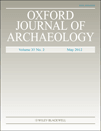
Oxford Journal of Archaeology
Connecting Scholars, Inspiring DiscoveriesOxford Journal of Archaeology is a prestigious peer-reviewed journal published by WILEY, dedicated to advancing the field of archaeology through innovative research and insightful discourse. Established in 1982, this journal has become a vital resource, showcasing high-impact studies that resonate within the arts and humanities, as well as interdisciplinary fields such as geography and planning. With an impressive Q1 ranking in both Archaeology and Arts & Humanities categories, and a Q2 ranking in Geography, Planning, and Development, the journal consistently maintains its reputation for excellence—evidenced by its ranking in the 81st percentile within the Scopus Arts and Humanities Archaeology category. The Oxford Journal of Archaeology not only provides scholars, professionals, and students with access to cutting-edge archaeological research but also encourages collaboration and dialogue among a diverse academic community. Although the journal does not currently offer Open Access, it remains a crucial platform for those seeking to expand their knowledge and impact in this dynamic field.
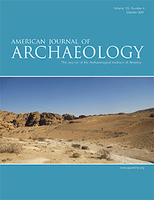
AMERICAN JOURNAL OF ARCHAEOLOGY
Bridging Time: Where Archaeology Meets InnovationThe American Journal of Archaeology (ISSN: 0002-9114, E-ISSN: 1939-828X), published by the esteemed University of Chicago Press, stands as a leading scholarly journal in the field of archaeology, celebrated for its rigorous peer-reviewed research. With an impressive impact factor that places it in the Q1 quartile for both archaeology and archaeology within the arts and humanities, this journal ranks among the top 15% in its field, according to Scopus metrics. It serves a global audience of researchers, professionals, and students, facilitating the dissemination of innovative findings from excavations, historical analyses, and methodological advancements. While primarily available through subscription, the journal's archives and features provide invaluable resources for deepening one's understanding of the past and engaging with current archaeological discourse. Operating from its home in Chicago, USA, the American Journal of Archaeology actively contributes to the advancement of knowledge and scholarship in archaeology, making it an essential platform for those invested in the exploration of ancient civilizations and cultural heritage.
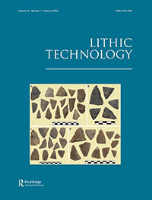
Lithic Technology
Elevating the Discourse in Archaeological LithicsLithic Technology is a premier international journal published by Routledge Journals, Taylor & Francis Ltd, dedicated to advancing the field of lithic studies in archaeology and anthropology. Established in 1977, this prestigious journal has established itself at the forefront of research concerning stone tool technology, providing a vital forum for scholars to share groundbreaking findings and methodologies. With an impressive Q1 ranking in both Archaeology and Anthropology, and indexed within the 91st percentile in its respective categories by Scopus, Lithic Technology is recognized for its significant contributions to the understanding of human prehistory and material culture. The journal features a diverse array of articles, from theoretical approaches to practical case studies, ensuring relevance to contemporary archaeological discourse. Though not an open-access publication, its meticulous peer-review process guarantees the highest quality of scholarship, making it an indispensable resource for researchers, professionals, and students eager to expand their knowledge in the rigors of lithic analysis.

SOUTH AFRICAN ARCHAEOLOGICAL BULLETIN
Connecting Scholars to South Africa's Archaeological Legacy.Welcome to the SOUTH AFRICAN ARCHAEOLOGICAL BULLETIN, a premier academic journal dedicated to the dynamic field of archaeology in South Africa and beyond. Published by the SOUTH AFRICAN ARCHAEOLOGICAL SOC, this journal boasts an impressive Q1 ranking in both Archaeology (arts and humanities) and Archaeology categories as of 2023, placing it among the top tier of scientific journals in its discipline. With an extensive publication history spanning from 2002 to 2023, it serves as a crucial platform for disseminating pioneering research and scholarly discussions that illuminate the rich tapestry of South African archaeological heritage. Although it does not currently offer open access, the journal’s rigorous peer-review process, combined with its standing in the Scopus rankings—where it ranks 78 out of 413 in the arts and humanities and 75 out of 354 in social sciences—underscores its commitment to academic excellence. Researchers, professionals, and students alike will find this journal an essential resource for exploring innovative methodologies, archaeological discoveries, and theoretical advancements shaping the understanding of human history.
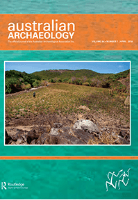
AUSTRALIAN ARCHAEOLOGY
Pioneering Research in the Heart of Archaeology.AUSTRAILIAN ARCHAEOLOGY, published by Taylor & Francis Ltd, is a leading academic journal dedicated to the field of archaeology. With a strong reputation as evidenced by its Q1 ranking in both the Arts and Humanities and Social Sciences categories, this journal fosters the growth and dissemination of pioneering research from diverse archaeological contexts. The journal has been a vital resource for scholars and practitioners since its convergence in 2002, supporting the collective advancement of knowledge in the archaeological discipline. By offering a platform for rigorous analysis and critical discussions, AUSTRAILIAN ARCHAEOLOGY appeals to a wide audience, from established researchers to students beginning their journey in archaeology. Although it is not an Open Access journal, the insights provided are invaluable for enhancing understanding and appreciation of Australia’s rich archaeological heritage. With a Scopus ranking that places it among the top contenders in its field, this journal continues to contribute significantly to outstanding archaeological scholarship and professional practice.
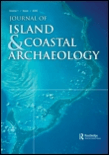
Journal of Island & Coastal Archaeology
Diving Deep into Island Archaeological DiscoveriesThe Journal of Island & Coastal Archaeology, published by Routledge Journals, Taylor & Francis Ltd, stands as a leading publication in the fields of archaeology, ecology, and history, boasting a prestigious Q1 ranking in multiple categories as of 2023. Since its inception in 2006, this journal has been a vital resource for researchers, professionals, and students interested in the rich archaeological heritage of island and coastal regions. With an impressive Scopus ranking that places it in the top tiers of both Arts and Humanities and Social Sciences, it offers insightful studies and innovative methodologies that address the complexities of human interactions with marine and terrestrial environments. The journal aims to advance knowledge and promote discussion through rigorous peer-reviewed articles, fostering a deeper understanding of indigenous cultures and their environmental contexts. While currently not offering an open-access model, the journal remains committed to disseminating high-quality research crucial for shaping future archaeological scholarship.